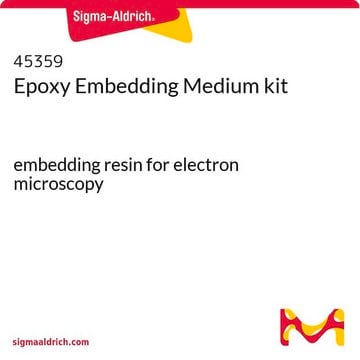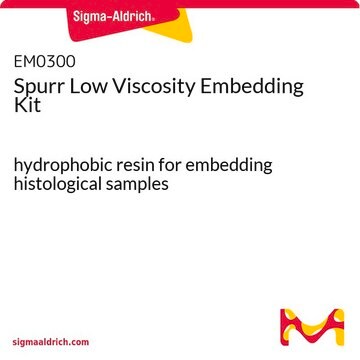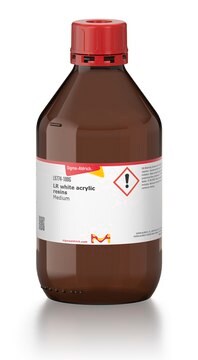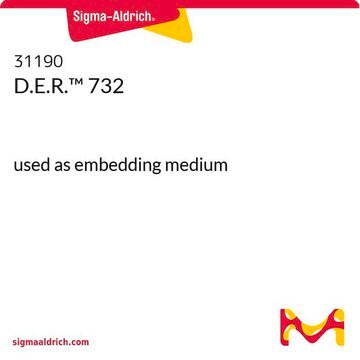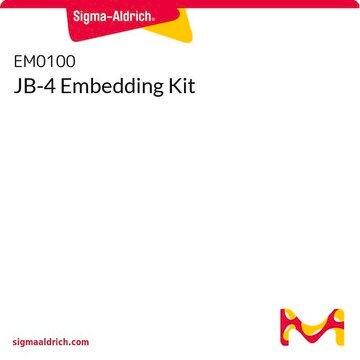45345
Epoxy embedding medium
for microscopy
Synonym(s):
Epon™ 812 substitute
Sign Into View Organizational & Contract Pricing
Select a Size
All Photos(1)
Select a Size
Change View
About This Item
UNSPSC Code:
41102904
NACRES:
MA.02
Recommended Products
biological source
synthetic
Quality Level
grade
for microscopy
form
viscous liquid
impurities
glycerol glycidyl ethers
color
colorless to faint yellow
refractive index
n/D 1.480-1.483
suitability
suitable for (use as an embedding medium)
suitable for microscopy
application(s)
hematology
histology
storage temp.
room temp
General description
additional information see 45359 Epoxy Embedding Medium kit
Other Notes
Embedding media for electron microscopy
Legal Information
Epon is a trademark of Hexion, Inc.
related product
Product No.
Description
Pricing
signalword
Danger
hcodes
Hazard Classifications
Eye Irrit. 2 - Resp. Sens. 1 - Skin Irrit. 2 - STOT SE 3
target_organs
Respiratory system
Storage Class
10 - Combustible liquids
wgk_germany
WGK 3
flash_point_f
Not applicable
flash_point_c
Not applicable
Choose from one of the most recent versions:
Already Own This Product?
Find documentation for the products that you have recently purchased in the Document Library.
Customers Also Viewed
Exact anhydride epoxy percentages for electron microscopy embedding (Rpon).
C N Burke et al.
Journal of ultrastructure research, 36(1), 119-126 (1971-07-01)
Otilia Zarnescu et al.
Microscopy and microanalysis : the official journal of Microscopy Society of America, Microbeam Analysis Society, Microscopical Society of Canada, 23(3), 668-678 (2017-05-11)
Cytological responses in different organs of sentinel organisms have proven to be useful tools for characterizing the health status of those organisms and assessing the impact of environmental contaminants. Our study shows that nickel (II) accumulated in both germ cells
Jingyuan Wang et al.
International journal of molecular medicine, 45(6), 1875-1887 (2020-04-03)
Multiple mechanisms are involved in regulating hepatic ischemia‑reperfusion injury (IRI), in which Kupffer cells (KCs), which are liver‑resident macrophages, play critical roles by regulating inflammation and the immune response. Suberoylanilide hydroxamic acid (SAHA), a pan‑histone deacetylase inhibitor, has anti‑inflammatory effects
T Martinovic et al.
Tissue & cell, 52, 92-100 (2018-06-03)
Type 2 diabetes is an endocrine disorder characterized with hyperglycemia, hyperinsulinemia and insulin resistance. Morphological changes in cell nuclei in diabetes were recently detected. The aim of this study was to compare electron microscopic features of lymphocyte nuclei in type
Tatyana Shulyatnikova et al.
Brain research, 1751, 147174-147174 (2020-11-12)
Endogenous toxicity caused by systemic inflammation as well as by acute liver failure triggers a wide range of dysfunctional disorders in the brain ranging from delirium and acute psychosis to coma. Astrocytes, the main homeostatic cells of the central nervous
Our team of scientists has experience in all areas of research including Life Science, Material Science, Chemical Synthesis, Chromatography, Analytical and many others.
Contact Technical Service